#Breast Cancer Recurrence
Explore tagged Tumblr posts
Text
Breast Cancer Recurrence: Can Treatment Abroad Lower Your Risk?

What is Breast Cancer Recurrence?
Breast cancer recurrence means that cancer has returned after treatment and a period when it was undetectable. It can reappear in the same location (local recurrence), in surrounding tissues or lymph nodes (regional recurrence), or in distant organs like the lungs, bones, or brain (distant recurrence or metastasis).
Recurrence doesn’t necessarily mean previous treatment failed. Some microscopic cancer cells might survive treatment, lying dormant in the body for years before reactivating.
Types of Breast Cancer Recurrence
Local Recurrence: Returns in the same breast, chest wall, or surgical scar.
Regional Recurrence: Appears in lymph nodes near the collarbone or underarm.
Distant Recurrence (Metastasis): Spreads to remote organs like bones, liver, or brain.
Each type requires different treatments, but they all carry an emotional burden for the survivor. The good news? With advancements in global healthcare, recurrence risks can be minimized.
What Increases the Risk of Recurrence?
Several factors can increase Breast Cancer Recurrence risk:
Stage and grade of cancer at diagnosis
Hormone receptor (HR) status: HR-negative cancers are more aggressive
HER2 status: HER2-positive had high recurrence but is now treatable with targeted therapies
Lymph node involvement at diagnosis
Skipping or stopping hormone therapy or other follow-up treatments
Despite these risks, seeking treatment abroad is becoming a powerful option to improve survival outcomes and minimize recurrence.
How Does Treatment Abroad Help?
1. Advanced Technology and Diagnostics
Top international hospitals in India, Germany, the USA, Turkey, and South Korea provide cutting-edge tools like:
3D mammography and breast MRI for better detection
PET-CT fusion imaging for precise staging
Proton therapy and IMRT to target cancer cells more accurately
These innovations are often not available or affordable in all regions, making medical travel a strategic choice.
2. Multidisciplinary Cancer Teams
Hospitals abroad offer integrated care where oncologists, radiologists, surgeons, geneticists, and therapists collaborate. This synergy leads to more personalized treatment plans and lowers the chance of missing hidden cancer cells.
3. Genetic and Molecular Testing
Access to tests like Oncotype DX, MammaPrint, or BRCA gene testing helps personalize treatment. These can predict the risk of recurrence and inform decisions about chemotherapy or preventive surgery.
4. Access to Targeted Therapies
International centers offer newer treatments such as:
CDK4/6 inhibitors for HR-positive cancers
PARP inhibitors for BRCA mutation carriers
Immunotherapy for triple-negative breast cancers
These therapies are game-changers in lowering recurrence risk for high-risk individuals.
5. Clinical Trials and Experimental Options
Top hospitals abroad often host global clinical trials that offer access to breakthrough treatments. For survivors or high-risk patients, these could mean better protection against recurrence.
6. Comprehensive Aftercare and Monitoring
Abroad, many centers offer long-term monitoring programs with:
Regular imaging
Blood tests for tumor markers
Diet and lifestyle counseling
Psychological support
This 360-degree care not only improves recovery but also detects recurrence early—when it’s easier to treat.
How EdhaCare Supports You
Navigating treatment options abroad can be overwhelming, but this is where EdhaCare steps in. As a trusted medical tourism facilitator, EdhaCare specializes in connecting patients with top international cancer hospitals.
Here’s what EdhaCare offers:
Customized Hospital Shortlisting: Based on your medical reports and needs, we find the best hospitals globally.
Doctor Consultations: Schedule virtual consultations with top oncologists before travel.
Medical Visa & Travel Assistance: EdhaCare manages paperwork, visa processing, and logistics.
Language and Cultural Support: Get on-ground translators and local support during your treatment journey.
Follow-Up Coordination: Continued communication with your treating doctors even after returning home.
Whether you are in remission or just diagnosed, EdhaCare helps you access the most comprehensive cancer care globally.
Why Prevention is Better Than Fear
Living under the shadow of Breast Cancer Recurrence is emotionally exhausting. But choosing a proactive approach by seeking advanced care abroad gives you not just hope, but control. When you choose to get treated at world-class hospitals with the support of EdhaCare, you’re investing in peace of mind, better outcomes, and most importantly—your life.
Final Words
The fight against breast cancer doesn’t end with remission—it continues in the form of vigilance and smart choices. And today, one of the smartest decisions you can make is to consider international treatment options.
Don’t let fear of recurrence hold you back. Let EdhaCare help you take that next, powerful step toward a healthier future. Connect with us today and explore a world of advanced breast cancer care beyond borders.
0 notes
Text
Being chronically ill sucks for many reasons but one reason is that all the doctors are so focused on keeping your body from attacking itself/collapsing in on itself that it’s like “uhh I think my brain/emotions are kinda being neglected here :/“
#my oncologist: hey I’m giving you a referral to get some bloodwork done it took like 5 minutes#me: cool! can I also get a referral to get screened for ADHD like you said I should?#my oncologist: *radio silence*#I think the undiagnosed ADHD is screaming at me rn#also it’s weird because I technically don’t have cancer anymore but I’m on a shit ton of meds to keep it from coming back#and it like majorly affects my life#so it’s chronic symptoms to prevent a recurrence of the chronic illness#the self gatekeeping inside of me is astronomical#chronic illness#chronically ill#cancer#cancer survivor#breast cancer#breast cancer survivor#adhd#undiagnosed adhd
22 notes
·
View notes
Text
Why does cancer come back even after treatment? This is a question that many cancer patients and their families struggle with. Tahira Kashyap’s second battle with breast cancer raises this important question. In this blog, I explore the Ayurvedic perspective on cancer recurrence and how Ayurveda can help address the root causes of disease.
Ayurveda believes that true healing goes beyond just treating the body; it’s about healing the mind, spirit, and lifestyle. In this article, I delve into how emotional health, doshic imbalances, and lifestyle factors play a critical role in the recurrence of cancer. 🌿
Key insights from Ayurveda on cancer recurrence:
🌱 Emotional Health
🍃 Doshic Imbalance
🌀 Diet and Lifestyle
🌿 The Mind-Body Connection
Read the full blog to understand how Ayurveda can provide a holistic approach to preventing cancer recurrence: 🔗 Read More
#Ayurveda#Breast Cancer#Holistic Healing#Mind-Body Connection#Natural Health#Cancer Recurrence#Emotional Health#Wellness
0 notes
Text
youtube
#Breast cancer#postmastectomy radiotherapy#PMRT#overall survival#clinical prognostic stages#neoadjuvant therapy#NAT#ypN0#pathological lymph node status#radiation oncology#local recurrence#distant metastases#disease-free survival#personalized medicine#cancer recurrence#therapeutic benefits#breast cancer treatment#oncological outcomes#clinical oncology#survivorship care.#Youtube
0 notes
Text
#Breast cancer is one of the most common cancers among women#and advancements in medical science have significantly improved treatment options and outcomes. Many patients experience successful treatme#but the reality remains: even after successful treatment#there is still a possibility that breast cancer can return. This phenomenon#known as recurrence#is a critical aspect of breast cancer that patients and healthcare providers must navigate.#health & fitness
0 notes
Text
In the search for a cure for breast cancer, a major breakthrough has finally come. Biotechnology company Anixa Biosciences, Inc. announced earlier this month that its breast cancer vaccine, which is being designed with the help of the Cleveland Clinic, has completed phase one of its clinical testing. It will be moving forward to the next stages of development, and if all goes to plan, doctors may soon be able to stop cancerous tumors from forming.
“The vaccine is designed to mobilize the patient’s immune system to find, recognize, and destroy breast cancer cells for primary prevention,” Amit Kumar, Ph.D, CEO of Anixa Biosciences, Inc., tells Vogue. “If a patient is vaccinated and [their] immune system is trained to destroy the cancer cells when the cancer appears, the vaccinated immune system will destroy the cells before they can grow into a cell tumor.”
The vaccine, which comes in a set of three shots given to patients two weeks apart, specifically targets alpha-lactalbumin, a milk protein that is produced during lactation. It is typically not found after lactation in normal breast tissue, but scientists have found that the protein is expressed in about 70% of triple-negative breast cancer (TNBC) cases. The hope, Rima Patel, MD, oncologist and assistant professor in the division of hematology and medical oncology at Mount Sinai, explains, is that the vaccine can train people’s immune system to recognize the protein as harmful and attack it before it turns into cancer.
“It is designed to alert the immune system to attack a breast tumor, before it can develop or recur, and prevent it from growing,” says Dr. Patel. “It has been studied in an early phase one clinical trial in 35 women who had a history of early-stage TNBC and are at high risk of recurrence, and in patients without a history of cancer but are at high risk of developing breast cancer due to a genetic predisposition or other factors. The study thus far showed that the vaccine is overall well tolerated and resulted in an immune response in most patients.”
Research in mice shows that the vaccine has been successful in activating the immune system against alpha-lactalbumin and preventing breast tumors in these small creatures. While the vaccine shows promise in humans, Dr. Kumar says they have to test larger numbers and with control groups in the next phases to show its efficacy and safety.
56 notes
·
View notes
Text
A small clinical trial conducted at WashU Medicine shows promising results for patients with triple-negative breast cancer who received an investigational vaccine designed to prevent recurrence of tumors. Shown, William E. Gillanders, MD, (right) and Xiuli Zhang, MD, examine blood test results indicating study participants' responses to the vaccine. The early-stage trial indicated that the treatment is safe and elicits immune responses. A small clinical trial shows promising results for patients with triple-negative breast cancer who received an investigational vaccine designed to prevent recurrence of tumors. Conducted at Washington University School of Medicine in St. Louis with a therapy designed by WashU Medicine researchers, the trial is the first to report results for this type of vaccine — known as a neoantigen DNA vaccine — for breast cancer patients.
Continue Reading.
133 notes
·
View notes
Text
Vaccines are good science. Here is just another example of how well they work..
33 notes
·
View notes
Text
Hey guys just wanted to let you know what's going on and why I haven't posted, earlier right before October started I was on a good roll with fics and uploading at a good pace. Well that stopped simply for one reason and one reason only. My health. I have recurrent arrhythmia and when my heart skips a beat it hurts quite a bit and I began getting depressed over my chest pain...then the pain began under my right shoulder in the armpit area more closer to my breast. I talked to my mother in law and she guided me through checking my breast's where I then found a lump on my right breast. Still on a waiting list to even be seen so that I can get a mammogram which has made my depression worse. I was going to upload a bunch of fics all with creepy themes but lost the motivation once I found out I may have breast cancer. I don't know if I do or anything cause I still haven't seen a doctor but I did want to let you guys know that I have been getting your requests and I will work on them eventually I just wanna say I'm sorry for not uploading this month and hopefully I'll get out of this slump soon so I can interact with yall again
32 notes
·
View notes
Text
The pathology report is back.
My lymph nodes are clear and they removed the 14mm and 7mm tumors and confirmed the margins are clear from the left breast.
But this…They found cancer in my right breast as well. That's right. My “clean” breast, the breast that had been the unfortunate bystander, the collateral damage, suffering removal not because anything was wrong with it but because of my instinct, my reluctance to take the chance, to nervously watch it for years and hope cancer never showed up there. Well, it was there. Small (4mm), undetectable from the outside, just waiting to be found years from now when it got large enough to show up via imaging. Fuck me.
This is huge. It's been the elephant in the room. A few well-meaning hospital staff & friends were politely reminding me that the Big Double was not necessarily required. You know, there are less-invasive options.
Intuitively, I knew after years of watching them struggle with my mammograms, that doing a smaller surgery (that would have included radiation, that I now have avoided) and then just keeping a close eye on things, was ill-advised. All the imaging they had for me was from ABUS (ultrasound), which is what found my cancer in March. Following my diagnosis, my MRI offered no clear imaging either. This all confirms my prudent decision that vigilant screening was not the safest way to proceed into the future. Not only did I not want to go through this again (I've witnessed many women deal with breast cancer recurrence), but I don’t think I’d have the bandwidth for another round. This has required so much effort emotionally and physically, not to mention financially, on not just me, but my precious family and loved ones.
It was a huge revelation from the doctor. It hit me harder than my original diagnosis. I cried out loud. "You made the right decision," she said, the tumor board was stunned. Can we all exhale together?
She also told me I will NOT need chemo!!!
Next week I meet with both my oncologists and begin hormone repression treatment to mitigate recurrence.
I’m so ready to crawl out of this fog of war. I want nothing more than to return to attentive Cy, able to tend not just receive. But I’m aware that I'm physically handicapped for six weeks of recovery from this surgery. And I’m determined to heal my heart and mind properly as I continue on this project with treatment. So tender as I go.

My paragon, my saint: Frida Kahlo
"At the end of the day, we can endure much more than we think we can." Frida Kahlo
9 notes
·
View notes
Text
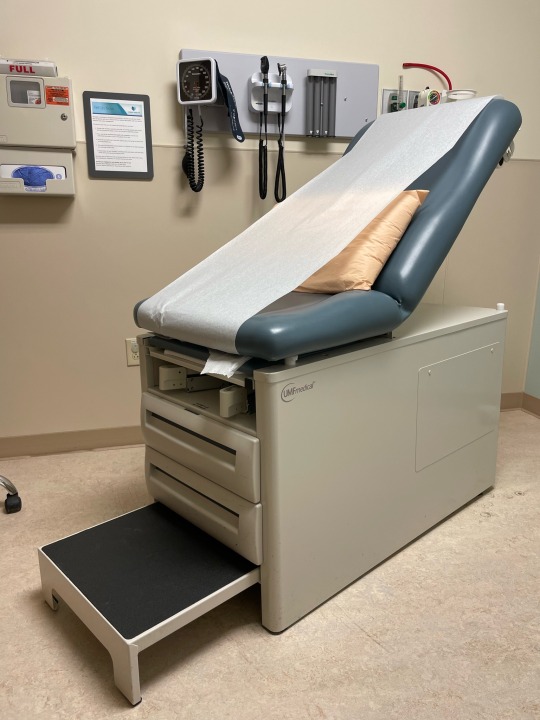
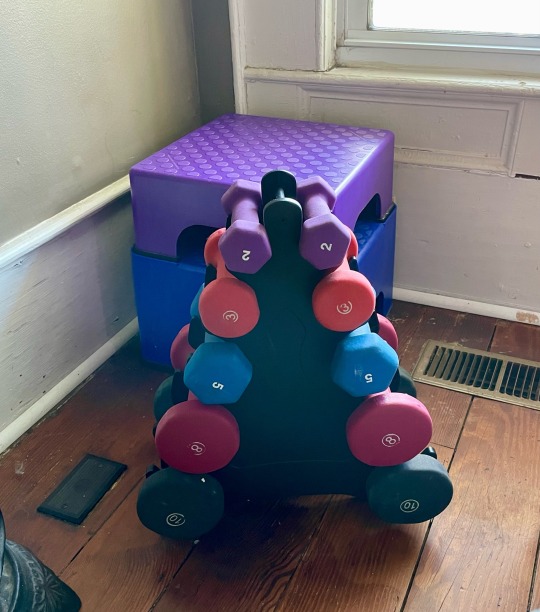

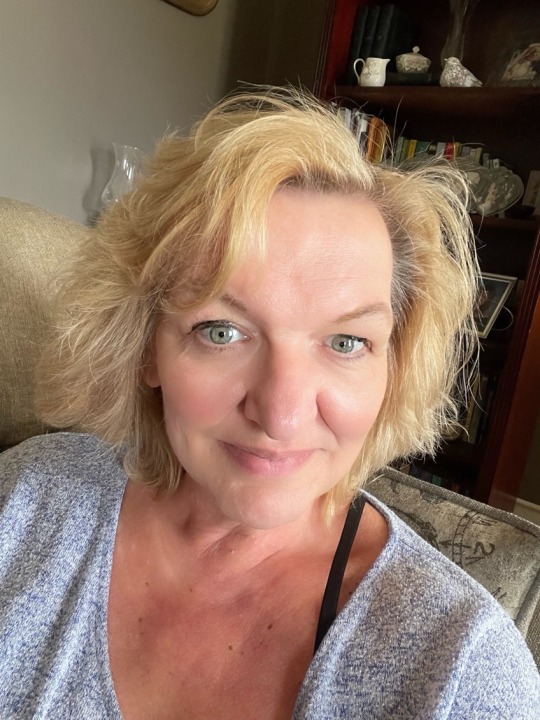
Weekly Wrap Up
Saw my chemo oncologist this week. He and the nurses were fussing (in a good way) over how much weight I’ve lost and the shape I am in. And I gotta tell ya, I needed that. I was getting discouraged because it has slowed from 7-8 pounds a month to 4 or 5 if I’m lucky. He was saying that when “women of a generous size” (so sweet how he put it! Lol) go through breast cancer, the best indication of not having a recurrence is taking off the extra weight, and that in all these years I’m one of his few patients who’ve done it. So that gave me that kick in the butt to stop looking at the downside and look at what I’ve accomplished and now I have thrown some weight training into my daily routine and added another loop to my walk bringing me up to 2 miles at a time.
I may not be very athletic, but I am organized. (New dumbbell rack)
It was WINDY walking today! My hair was all over the place when I was done.
And my Azaleas by the Smokehouse are blooming while my Irises try to take over the yard.
Now, it’s iced coffee time! 🧋
48 notes
·
View notes
Text

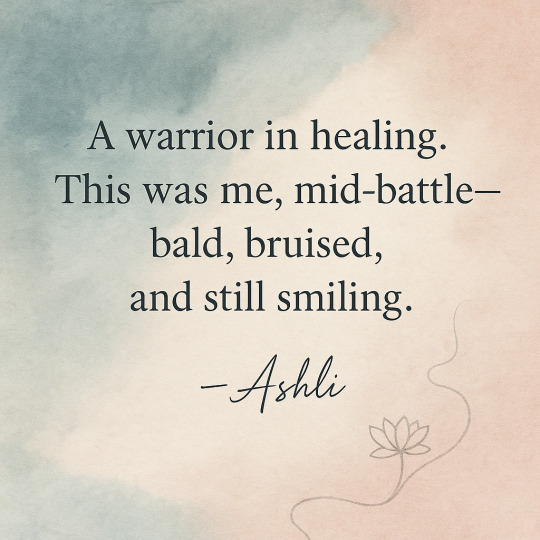
“A warrior in healing. This was me, mid-battle—bald, bruised, and still smiling.”
I was 25 when I was diagnosed with cervical cancer caused by HPV. Within days, I was told I’d need a hysterectomy. I had to meet with a fertility doctor to discuss options I couldn’t afford— all while trying to process a future I didn’t choose.
That was just the beginning.
Since then, I’ve faced:
Two recurrences
An ileostomy, colostomy, and nephrostomy
A breast cancer scare
A life saving blood transfusion that led to an HIV test
Multiple organ complications from chemo
And the moment I had to sign over temporary guardianship of my son
But I’m still here.
In remission. Still healing. Still fighting for every tomorrow.
This is why I started The Healing Chapter—to tell the truth out loud. To speak on HPV, cancer, motherhood, and what it means to survive a system that nearly broke me.
If even one person feels seen because I shared this, it’s worth it.
🌱 🔗 Read the full story: Why I’m Here — And Why I’m Sharing My Story
#healing#healing journey#mental health#resilience#self discovery#cancer survivor#the healing chapter#grief and growth#healingblr#emotional healing#recovery community#personal reflection#quiet strength#soft moments#tumblrvideo
2 notes
·
View notes
Text
youtube
#Chemotherapy#older patients#early breast cancer#geriatric oncology#cancer treatment#personalized medicine#targeted therapy#genomic testing#recurrence reduction#survivorship#comorbidities#side effects#cardiac risk#neuropathy#fatigue#geriatric assessment#organ function#patient care#oncologist#tailored therapies.#Youtube
0 notes
Text
#Breast cancer is one of the most common cancers among women#and advancements in medical science have significantly improved treatment options and outcomes. Many patients experience successful treatme#but the reality remains: even after successful treatment#there is still a possibility that breast cancer can return. This phenomenon#known as recurrence#is a critical aspect of breast cancer that patients and healthcare providers must navigate.
1 note
·
View note
Text
Understanding Cancer: Causes, Treatments, and the Role of Edhacare
What is Cancer?
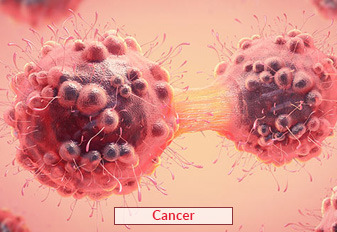
Cancer is a disease marked by the uncontrolled growth and spread of abnormal cells in the body. These cells can invade surrounding tissues and may also spread to distant parts of the body, a process known as metastasis. It’s important to understand that cancer is not a single disease but a group of related diseases—there are more than 100 types, each named for the organ or type of cell where it originates.
At its core, cancer is a genetic disease. It results from changes (mutations) in DNA that affect genes controlling cell division and function. These genetic alterations can be inherited or caused by environmental exposures, such as tobacco smoke, radiation, or infections.
Global Impact and Increasing Incidence
Cancer was responsible for nearly 10 million deaths worldwide in 2020, making it one of the leading causes of death globally. One of the main reasons for the increase in cancer incidence is aging. As people live longer, age-related mutations accumulate in the body, increasing the likelihood of cancer development.
How Cancer Develops
The DNA in each cell contains numerous genes that instruct the cell on how to grow, divide, and carry out various functions. When these instructions are disrupted, cells may begin to multiply uncontrollably, forming tumors. While not all tumors are cancerous (benign), malignant tumors have the ability to invade nearby tissues and spread throughout the body.
Cancer Treatment Procedures
Cancer treatment varies based on the type and stage of cancer, as well as the patient’s overall health. A multidisciplinary approach is often used to personalize treatment. The primary goal is to cure the disease or prolong life while improving the patient’s quality of life.
Types of Cancer Treatment
Primary Treatment: Typically involves surgery, radiation, or chemotherapy to completely remove or destroy cancer.
Adjuvant Treatment: Used after the primary treatment to eliminate any remaining cancer cells and reduce the risk of recurrence.
Palliative Treatment: Focuses on relieving symptoms and improving comfort, especially in advanced stages.
Diagnostic Methods
Early detection significantly improves treatment outcomes. This includes:
HPV Testing for cervical cancer.
Mammography for breast cancer screening, particularly for women aged 50–69.
At Edhacare, we guide patients through the entire diagnostic process, helping them access advanced imaging, pathology labs, and top-tier hospitals across India and other countries for early and accurate cancer detection.
Modern Cancer Therapies
Radiation Therapy
Radiation therapy uses high-energy X-rays to target and kill cancer cells. It can be external or internal (brachytherapy). This treatment aims to destroy cancer cells while minimizing harm to surrounding healthy tissues.
Chemotherapy
Chemotherapy involves drugs that attack rapidly dividing cells. While effective, it can also affect healthy cells, leading to side effects. Many cancers are treated with chemotherapy alone or in combination with other treatments.
Immunotherapy
Immunotherapy boosts the immune system's ability to fight cancer. It includes treatments like immune checkpoint inhibitors and CAR-T cell therapy. This is especially promising for cancers like melanoma and lung cancer.
Targeted Therapy
This approach uses drugs that specifically target the genetic abnormalities in cancer cells. It causes fewer side effects and is often combined with other treatments for maximum effect.
Palliative Care
Palliative care is crucial for managing symptoms and maintaining dignity in advanced stages of cancer. It includes pain management, emotional support, and spiritual care. Edhacare connects patients to palliative specialists, hospices, and counseling services that offer holistic care.
Edhacare’s Role in Cancer Care
Edhacare serves as a trusted partner in cancer treatment and care coordination. From initial diagnosis to treatment selection, we assist international patients in finding the best hospitals, oncologists, and affordable treatment packages. We also provide support for medical visas, accommodation, and translators—ensuring a seamless healthcare journey.
In addition, Edhacare emphasizes early detection and prevention, offering comprehensive check-up packages, awareness campaigns, and educational resources to help patients stay ahead of the disease.
Cancer Prevention Tips
While not all cancers are preventable, adopting a healthy lifestyle significantly lowers risk. Key prevention strategies include:
Avoiding smoking and exposure to tobacco
Limiting alcohol consumption
Eating a balanced, plant-rich diet
Maintaining a healthy weight
Exercising regularly
Getting vaccinated (e.g., HPV, Hepatitis B)
Participating in regular screenings
Edhacare facilitates access to preventive health check-ups and vaccination programs through its network of trusted healthcare partners.
Conclusion
Cancer remains one of the most formidable health challenges worldwide. Yet, with advances in medical science, early detection, and personalized treatments, survival rates and quality of life are improving. Edhacare is proud to play an integral role in supporting cancer patients—empowering them with the right information, access to world-class care, and compassionate support throughout their journey.
2 notes
·
View notes
Text
Avocados contain carotenoids, monounsaturated fats and antioxidants like glutathione, which protect cells from damage and inhibit cancer growth. Research highlights avocatin B, a unique fat in avocados, as effective in targeting leukemia stem cells, offering potential for preventing AML recurrence. Studies also link avocado consumption to reduced risks of colorectal, lung and bladder cancers, though further research is needed on its association with breast cancer risk.
Avocados are rich in beta-sitosterol, which supports healthy cholesterol levels by reducing LDL (bad cholesterol) and enhancing HDL (good cholesterol). Their high potassium content helps regulate blood pressure, making them effective in preventing hypertension, strokes and clogged arteries. Studies show avocado-enriched diets significantly improve cholesterol levels compared to high-carbohydrate diets.
Beyond cancer and heart health, avocados support joint, skin and eye health. They are rich in lutein and zeaxanthin, which protect against age-related macular degeneration and cataracts. Their beta-carotene and provitamin A promote skin repair, while their high-fat content aids in weight management by increasing satiety and reducing calorie intake.
Avocados can be easily incorporated into meals, from salads and smoothies to healthy puddings. Consuming the dark-green flesh closest to the skin maximizes nutrient intake, particularly carotenoids.
Revered by ancient Aztec civilizations, avocados are now recognized by modern science as a superfood. Their nutrient-rich profile makes them
6 notes
·
View notes